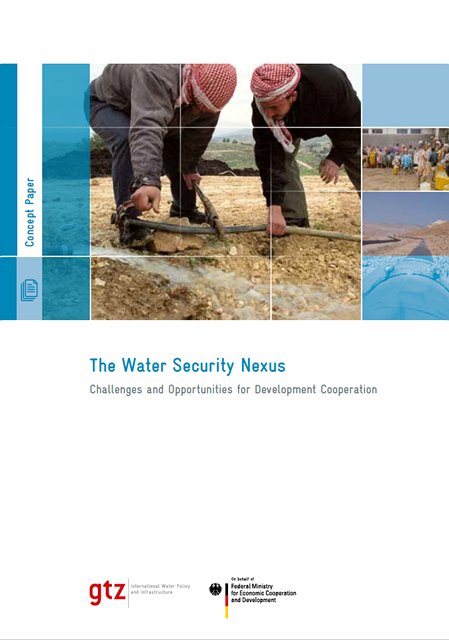The Water Security Nexus: Challenges and Opportunities for Development Cooperation
| Category | Nexus |
|---|---|
| Department | Deutsche Gesellschaft für Technische Zusammenarbeit (GTZ) GmbH International Water Policy and Infras |
| Published Date | 2010 |
| Author | Dr. Annabelle Houdret (adelphi, Berlin), Annika Kramer (adelphi, Berlin), Alexander Carius (adelphi, |
| Publisher | Deutsche Gesellschaft für Technische Zusammenarbeit (GTZ) GmbH International Water Policy and Infras |
| Pages | 36 |
| Language | English |
| ISBN |
본문

Find at: https://www.adelphi.de/en/publication/water-security-nexus
The Water Security Nexus: Challenges and Opportunities for Development Cooperation
Introduction
Is water the ‘gold of the 21st century,’ potentially triggering ‘water wars’ between countries sharing the precious resource?1 Such scenarios proliferated in the 1990s, but today a different paradigm is taking root. Politicians are beginning to emphasise the peace dividend of water cooperation; and development agencies are now supporting transboundary water cooperation projects around the world. And even at the highest level of political discourse, water cooperation has been identified as an entry point for broader peacebuilding.
In 2001, then UN Secretary-General Kofi Annan warned of water wars (Postel / Wolf 2001), but only a year later, he insisted on an alternate view: ‘[T]he water problems of our world need not be only a cause of tension; they can also be a catalyst for cooperation’ (UN 2002). Lacking water supply and conflict are issues also garnering significant attention in the context of climate change and threatened livelihoods.
Yet, while support for water cooperation is spreading, the potential for water conflict persists. Global environmental change fuels uncertainty about the future of water resources. Water quantity is called into question due to increasing temperatures and diminishing precipitation. Water quality is declining from mass pollution. Competition over water increases as demand rises for growing domestic, industrial, and agricultural needs. And where governance structures are unable to manage increasing competition, divergent interests may spur disputes with the potential for violent conflict.
The emergence of violence over water is a real concern. However, warnings over impending ‘water wars’ are largely without merit—historically, inter-country disagreements over water have seldom led to violence. Rather, water conflicts2 primarily occur at the sub-national level (Ohlsson 1999, Wolf 1998), where disputes can take many forms; from destruction of infrastructure or verbal attacks to actual violence among competing parties. But regardless of the form of conflict, weak livelihoods and poor governance of the resource are common themes in the evolution of disputes over water.
While some of the factors leading to water conflict have been identified, the topic remains largely unexamined. To further understand the genesis of water disputes, this study focuses on water conflicts in two contexts; access to and control of the resource. This study then looks beyond conflict to the ways in which water management engenders or facilitates cooperation. Throughout, this paper draws on examples from and lessons learned at the sub-national and international level. In the process of exploring past and present occurrences of water conflict and cooperation, this study seeks to answer three main questions:
|| Which trends may catalyse water conflicts in the near future? (Chapter 2)
|| Which approaches facilitate the conversion of conflict to cooperation? (Chapter 3)
|| How can development cooperation contribute to preventing and resolving water conflicts? (Chapter 4)
Is water the ‘gold of the 21st century,’ potentially triggering ‘water wars’ between countries sharing the precious resource?1 Such scenarios proliferated in the 1990s, but today a different paradigm is taking root. Politicians are beginning to emphasise the peace dividend of water cooperation; and development agencies are now supporting transboundary water cooperation projects around the world. And even at the highest level of political discourse, water cooperation has been identified as an entry point for broader peacebuilding.










